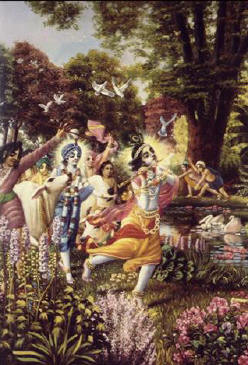"It's Not a Religion"
In addition to the very public fact that Elan Vital (previously Divine Light Mission), for nearly 40 years registered under US Government IRS Codes as, operating for Religious Purpose, there remain many aspects of Prem Rawat's presentation that appear religious. Prem Rawat frequently makes reference to religious texts and iconography, he talks about an inner self or 'heart' in a way that suggests a non material reality - something comparable to 'soul', and Rawat himself seeks and receives a degree of adulation that is common only to those holding elevated religious positions.
Religious Origins
The notions of guru and devotee, of spiritual enlightenment, of selfless service to the master, of meditation, and of living monastically in an ashram, all derive from Hinduism. Thus the Rawat message was steeped in the Hindu religion from its inception.
When Prem Rawat came to the West, his message to some degree took on a Christian slant. He quoted Jesus Christ (actually he only quoted the beginning of the gospel of John), and some Divine Light Mission Hindi terms were translated in Christian senses. For instance Prem Rawat often described himself as the Lord, (and even as the Almighty), and as a Father who had come to Earth to save his children from the Hell of their own minds.
There was a clear understanding among early premies that whilst God had sent his son to Earth 2000 years ago, this time he had come himself. Rawat's first international event in the West was named Millennium '73.
It is however important not to overstate the Christian references, Divine Light Mission's main influence was Hinduism. Rawat was rarely present in any given premie community in the West, so the chief authority was the nearest Mahatma, who was usually an Indian man with a shaven head wearing long saffron robes.
Experience Versus Belief
Rawat, Mahatmas and premies alike continuously stated in the 1970s: "This is not a religion: it's an experience". It was claimed that there were no rules and regulations, and no belief system - such as religions had.
In reality there was a plethora of beliefs; beliefs about the true identity of Prem Rawat, about the 'reality' of the 'Knowledge', about the deviousness of one's own mind and about the 'illusory' nature of the world.
In pursuit of these beliefs Premies engaged in rituals such as arti, darshan lines and drinking water in which Rawat had bathed his feet. They went on pilgrimages to hear him speak and they prostrated themselves before his photo, deifying not only Prem Rawat but also his family members.
Not a Religion, Not Belief, Then What is it?
Under the current promotion of Prem Rawat there are certainly less rituals and the language used has been purged of religious terms. Nevertheless Rawat is sometimes still referred to as the 'Lord' and darshan lines and arti have been quietly revived in private gatherings of the long term faithful.
Prem Rawat still uses copious imagery from scriptures, chiefly the Bhagavad Gita and the sayings of Kabir and still makes reference to Krishna in his speeches. Rawat's oratorical attacks on the mind and the 'illusory' nature of 'the world', are less frequent but the implication of his presentation of the 'inner experience' of 'Knowledge', that of "knowing your heart" is that the "outer world" is not important. A remarkable proposition from someone who is personally driven by consumption of material things.
Despite his public 'evolution' from Guru and Perfect Master to "inspirational speaker", many of Prem Rawat's followers still believe that he is infallible and his edicts and suggestions are never queried, even by his most trusted advisors. And therein lies the greatest contradiction of Prem Rawat for while Prem Rawat found the role of religious leader unhappily burdensome - he has never been able to bring himself to fully eschew his position of 'uniqueness'. In consequence the Prem Rawat movement is a religion without an acknowledged philosophy, his followers are worshippers without an admitted liturgy and Prem Rawat is a religious teacher without a 'teaching'.

